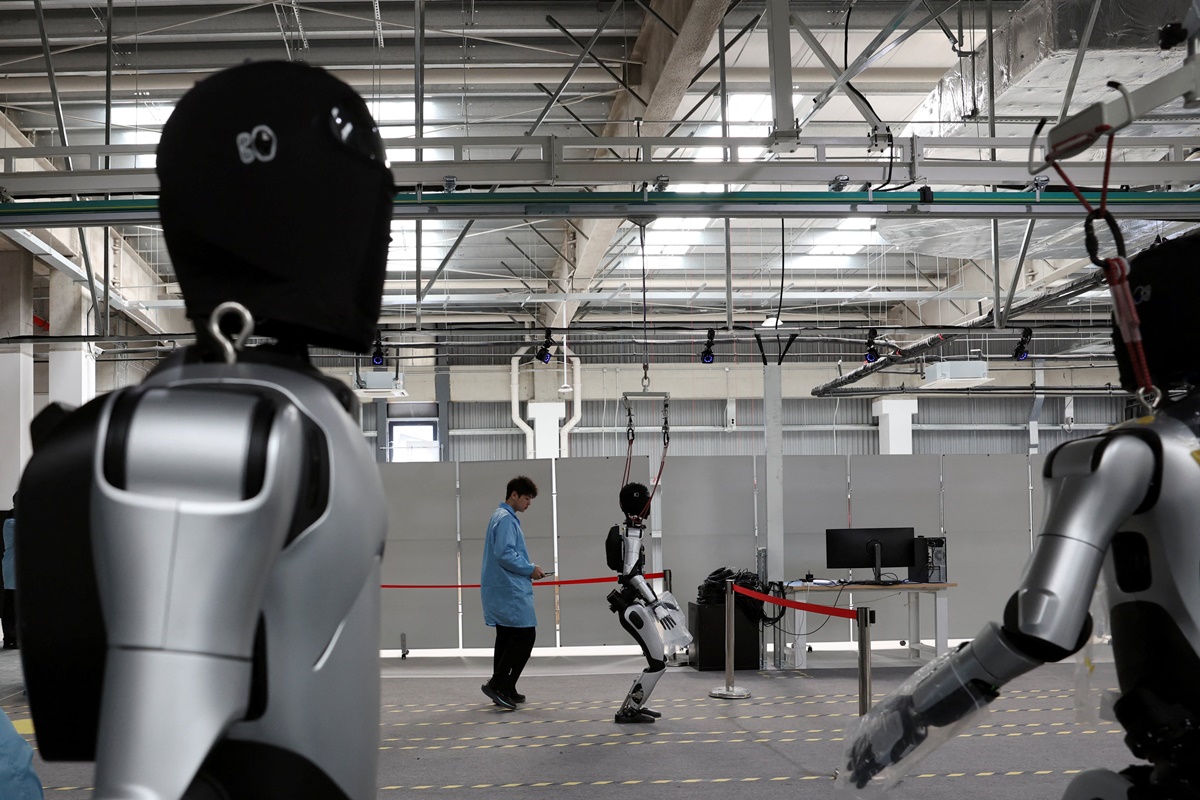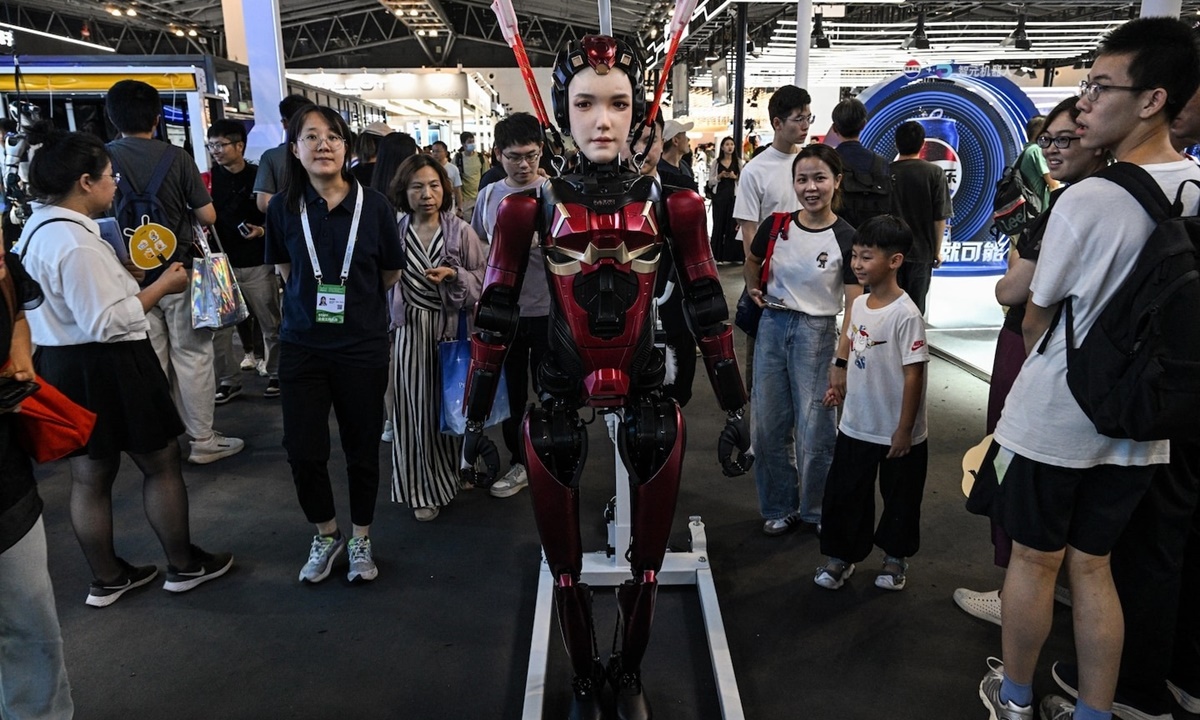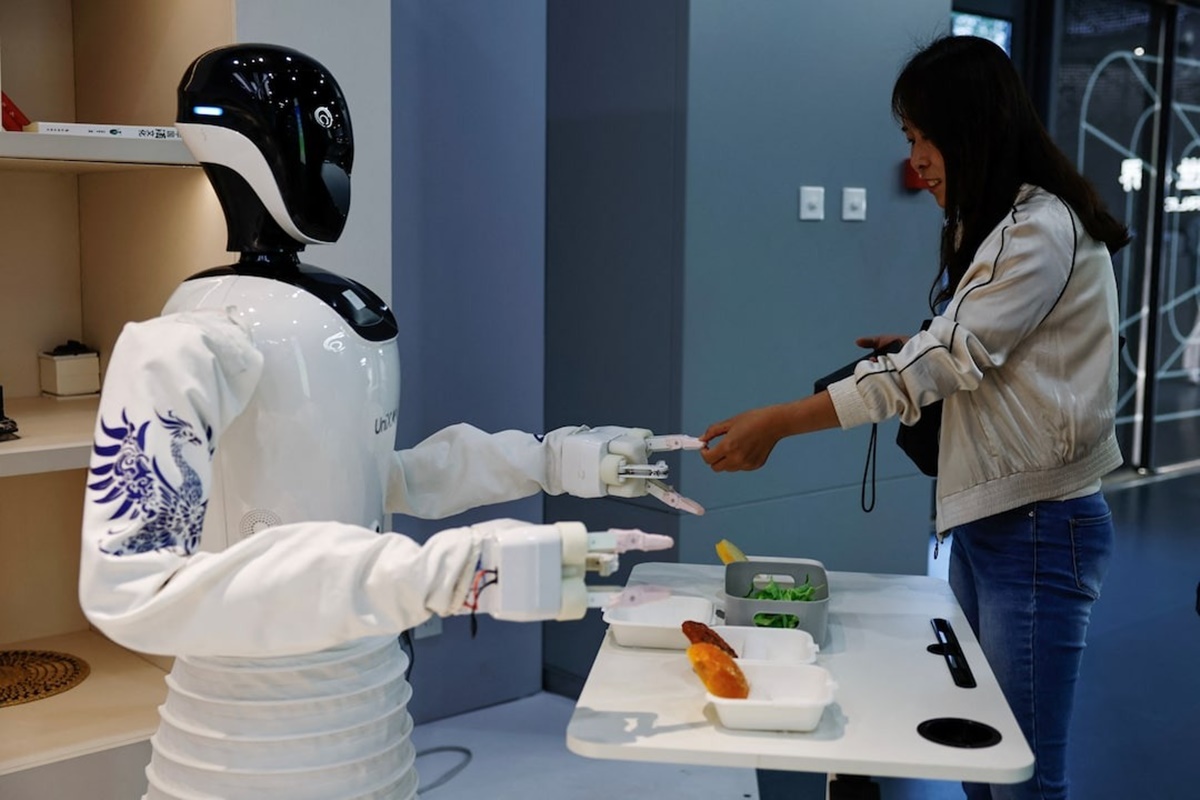China, facing restrictions from the US, lacks access to the most advanced chips needed to operate modern AI models and continues its efforts to catch up with Silicon Valley giants like OpenAI. However, experts believe Beijing is pursuing an alternative strategy to close this gap: aggressively promoting AI applications in government and the private sector.
"The Chinese government has issued a clear directive to disseminate AI technology throughout society," said Scott Singer, an expert on China's AI sector at the Carnegie Endowment for International Peace, based in Washington.
 |
A worker checks a robot on a production line at a factory in Shanghai, China, in March. Photo: Reuters |
A worker checks a robot on a production line at a factory in Shanghai, China, in March. Photo: Reuters
In contrast, the US is more focused on developing cutting-edge AI models while "completely overlooking how to apply them" practically, he added.
China's AI promotion policy was clearly demonstrated at the World Artificial Intelligence Conference in Shanghai, held from 26/7 to 29/7. Beijing announced the establishment of an international AI governance organization and a 13-point action plan to foster global cooperation, ensuring responsible AI development that benefits the entire world.
"China values global AI governance," Chinese Premier Li Qiang stated at the conference's opening ceremony on 26/7. He affirmed that China is "ready to share its AI development experience and technological products to support countries worldwide."
Former President Donald Trump also announced a plan to boost US AI competitiveness by reducing regulations and promoting AI technology exports globally.
In recent years, Washington has taken steps to prevent Beijing from accessing chips essential for AI development, partly due to concerns about the potential military applications of these models and the risk of the US losing its leading position.
However, the Trump administration's approach to chip policy has not been entirely consistent. Earlier last month, the White House reversed a previous ban on exporting certain Nvidia-produced AI chips to China.
The excitement surrounding AI was palpable inside the exhibition center in Shanghai's Pudong district, home to numerous skyscrapers. Crowds passed through facial recognition checkpoints. Thousands attended seminars featuring Chinese officials, entrepreneurs, and international researchers, or watched demonstrations of AI used to create video games, control robot movements, and provide real-time conversational responses through smart glasses.
Major Chinese tech companies like Huawei and Alibaba were present, alongside rising stars like Unitree Robotics. While DeepSeek was absent, their name was on everyone's lips.
This Hangzhou-based startup has spearheaded China's efforts to promote government use of AI since launching its first chatbot model in January. At the time, they created a global buzz, showcasing China's rapid advancements in the AI field.
Over the past 6 months, DeepSeek has been integrated into various government services. Bidding documents reveal that military hospitals in Shaanxi and Guangxi provinces have employed DeepSeek to build online health consultation and record systems.
According to several local government websites, state agencies have used DeepSeek to handle citizen calls and facilitate police work.
In a social media post in February, the government of a city in Inner Mongolia explained that DeepSeek helped police "quickly uncover case clues and predict crime trends." This "significantly improved the accuracy and timeliness of crime prevention work."
Anti-corruption investigations, a long-standing priority for Chinese President Xi Jinping, represent another common application of DeepSeek, with AI models used to scrutinize declarations for any suspicious anomalies.
In April, China's anti-corruption agency even included a book titled "Using DeepSeek Effectively" on its recommended reading list.
 |
A robot on display at the World Artificial Intelligence Conference in Shanghai. Photo: AFP |
A robot on display at the World Artificial Intelligence Conference in Shanghai. Photo: AFP
China's new AI action plan underscores this promotion policy, declaring that "the public sector should take the lead in deploying applications" by integrating AI into education, transportation, and healthcare. The plan also emphasizes the mission to use AI "to boost the real economy" and praises more easily shared open-source AI models as a method for equitable AI development.
Alfred Wu, an expert on Chinese public governance at the National University of Singapore, said Beijing has issued directives from the highest level requiring local governments to utilize AI. This move stems from the desire to improve China's AI capabilities amid fierce competition with the US, by granting models access to vast government databases.
But even with China's all-out push for nationwide AI application, not everyone believes they are guaranteed victory. Singer, who attended the AI conference in Shanghai, noted that China's slowing economy will significantly impact growth potential and access to capital in the AI industry. Beijing is struggling to control persistent deflation and a real estate crisis that has severely affected the financial health of numerous families.
"Much of China's AI policy is shaped by the state of the economy," he said. "The venture capital ecosystem in China's AI sector has dried up."
Shen Yang, an AI professor at Tsinghua University, explained that DeepSeek is not yet widely used in anti-corruption work because cases often involve sensitive information, and deploying new tools in these investigations requires a lengthy and complex approval process.
Professor Shen also pointed out that AI remains a developing technology with many issues. "If it's wrong, who is responsible?" he asked.
However, these concerns seemed distant in the bustling halls of the Shanghai AI conference. At one product booth, Carter Hou, co-founder of smart glasses company Halliday, explained how their lenses project a small black screen above the user's line of sight. This screen can display translations and summaries of any conversation, even deploying "proactive AI" to anticipate questions based on user interaction, thereby providing information in advance.
"For example, if you ask me a difficult knowledge-related question, all I need to do is look at that screen, use the information displayed on the glasses, and pretend to be very knowledgeable," Hou said.
 |
A humanoid robot is displayed at the Beijing Robot Industrial Park in the Beijing Economic-Technological Development Area in May. Photo: Reuters |
A humanoid robot is displayed at the Beijing Robot Industrial Park in the Beijing Economic-Technological Development Area in May. Photo: Reuters
Robots, perhaps the most obvious real-world application of AI, were ubiquitous at the conference. They populated mock factories, demonstrated fetching drinks in convenience stores, shook hands with children, or simply navigated the crowded halls.
Looking directly at a male student, one robot described his outfit: "Your clothes are both stylish and elegant. You have a confident and friendly demeanor, which makes you very attractive."
Vu Hoang (According to The Washington Post, AFP, Reuters)












